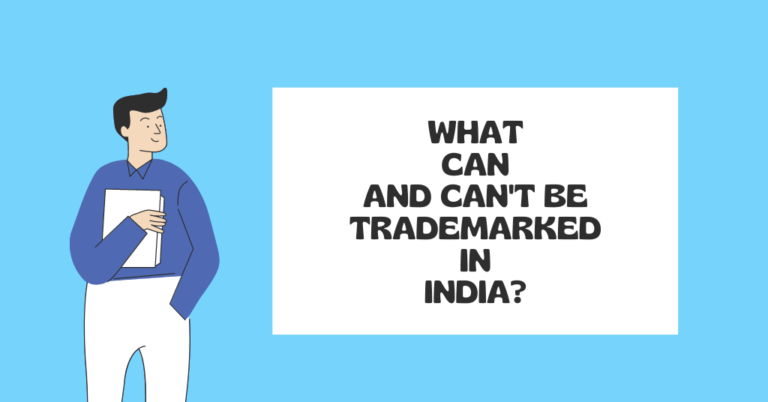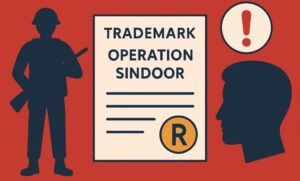Registration of a business’s trademark is one of the most important steps that can be taken to protect a company’s identity as well as the reputation of its goods or services in the marketplace. In India, the Indian Trademark Act of 1999 governs the legal framework for trademark protection. This act specifies the criteria for registering trademarks and those that are ineligible for protection. This article explores what can and cannot be trademarked according to the Indian Trademark Act,1999.
Table of Contents
ToggleSection 9: Absolute Grounds for Refusal of Trademark Registration
Section 9 of the Indian Trademark Act, 1999, enumerates the absolute grounds for refusal of trademark registration. These grounds identify categories of marks that are inherently incapable of being registered as trademarks in India. As per this this provision, trademark does not include any mark which is:
Devoid of Distinctive Character
Trademarks that lack distinctiveness or are generic or descriptive in nature are ineligible for registration. For example, the word “Computer” cannot be registered as a trademark for computer hardware, as it is a generic term. However, a distinctive and non-descriptive term like “Apple” can be registered as a trademark for a technology company.
Consisting Exclusively of Generic or Common Names
Trademarks that primarily consist of common or generic terms related to the goods or services offered cannot be registered. For instance, “Soap” cannot be registered as a trademark for a soap manufacturing company. However, a unique and distinct name like “Dove” can be registered as a trademark for a soap brand.
Customary in Current Language or Trade Practices
Trademarks that have become customary or usual in everyday language or trade practices are not registrable. This provision prevents the monopolization of common terms. For example, the term “Supermarket” cannot be registered as a trademark for a grocery store.
Likely to Deceive or Cause Confusion
Trademarks that are likely to deceive the public or cause confusion regarding the nature, quality, or origin of the goods or services are ineligible for registration. For instance, a mark that closely resembles an existing famous brand may cause confusion among consumers and therefore be refused registration.
Contrary to Law or Morality
Trademarks that are against public policy, offensive, or immoral are refused registration. This provision ensures that trademarks align with societal norms and values. For example, a mark containing explicit or offensive language would be rejected.
Section 11: Relative Grounds for Refusal of Trademark Registration
Section 11 of the Indian Trademark Act deals with the relative grounds for refusal of trademark registration. It focuses on the similarity or identity of the proposed mark with existing marks. Let’s understand this provision in more detail:
Under Section 11, a trademark application may be refused if it is identical or similar to an earlier registered trademark or pending application in the same or similar class of goods or services. The objective is to prevent confusion or misleading associations among consumers. The Registrar of Trademarks compares the proposed mark with existing marks and examines factors such as visual similarity, phonetic similarity, and conceptual similarity to determine the likelihood of confusion.
For instance, an online marketplace, Company M, intends to register the mark “eBayzy” for its e-commerce services. However, there is an existing registered mark for “eBay” owned by Company N, a well-known global online marketplace. Company M’s trademark application may be rejected under Section 11 due to the similarity and likelihood of confusion with the earlier registered mark.
What Can Be Trademarked?
The Act recognizes various forms of subject matter that are eligible for trademark protection. Let’s explore the different types of subject matter that can be trademarked:
Words, Names, and Slogans
One of the most common forms of trademarks is words or combinations of words that serve as brand identifiers. These can include brand names, product names, slogans, or catchphrases. Examples of word-based trademarks include “Google,” “Amazon,” “Just Do It” (Nike’s slogan), and “Think Different” (Apple’s slogan).
Logos and Designs
Trademarks can also take the form of logos, designs, symbols, or graphic elements. These visual representations serve as distinctive identifiers for businesses. Examples include the Nike “swoosh” logo, the Apple logo, the Mercedes-Benz three-pointed star emblem, and the Starbucks mermaid symbol.
Labels and Packaging
Distinctive labels and packaging designs can also be registered as trademarks. These help consumers identify specific products or brands based on their visual appearance. For example, the unique packaging of Toblerone chocolate bars, the curvaceous Coca-Cola bottle design, and the distinctive shape of the Pringles potato chip canister can be registered as trademarks.
Shape of Goods
Section 2(1)(zb) explicitly states that the shape of goods can be included as part of a trademark. This provision allows businesses to protect the distinctive shape of their products as a trademark. Notable examples include the unique shape of the Coca-Cola bottle, the iconic design of the Mini Cooper car, and the shape of the Toblerone chocolate bar.
Combinations of Colors
The Trademarks Act, 1999, recognizes that combinations of colors can also serve as trademarks. This provision allows businesses to protect unique color combinations associated with their brand. For instance, the specific red color used by Coca-Cola or the brown color associated with UPS can be registered as trademarks.
It is important to note that the mark must be capable of being represented graphically, meaning it can be visually depicted in a clear and understandable manner. Additionally, the mark must be capable of distinguishing the goods or services of one person or business from those of others. This means that the mark should possess distinctiveness and not be common or descriptive.
Conclusion
Trademark registration is a vital aspect of protecting the intellectual property rights of businesses. Under the Trademark Act, 1999, several types of trademarks are eligible for protection. It is crucial for businesses to understand these guidelines to ensure effective trademark protection and avoid potential conflicts. Seeking professional guidance and conducting a thorough trademark search before applying for registration can help businesses make informed decisions regarding their intellectual property rights in India.
Frequently Asked Questions
What can and can’t be trademarked in India?
In India, trademarks that can be registered include words, names, slogans, logos, designs, labels, packaging, shapes of goods, and combinations of colors. Non-distinctive or generic terms, descriptive marks, marks that are likely to cause confusion, deceptive marks, marks against public morality, and marks that are already in use or similar to existing registered marks cannot be trademarked. Additionally, marks that are contrary to law, government symbols, and marks that are devoid of distinctive character are also ineligible for trademark registration in India.
Can I trademark a common word?
Yes, it is possible to trademark a common word in India under certain conditions. While generic or commonly used words are generally considered less distinctive and harder to register as trademarks, it is still possible to obtain trademark protection for a common word if it is used in a unique or distinctive manner and has acquired secondary meaning associated with specific goods or services.
Can I trademark a color?
Yes, it is possible to trademark a color in India, but it can be a challenging process. In order to successfully register a color as a trademark, you must demonstrate that the color has acquired distinctiveness and is associated with your specific goods or services in the marketplace. You need to show that consumers recognize the color as an indicator of the source of the goods or services.
Can I trademark a misspelled word?
Yes, it is possible to trademark a misspelled word. The key consideration for trademark registration is the distinctiveness of the mark. If the misspelled word is unique and distinctive enough to differentiate your goods or services from others, it may be eligible for trademark protection.
Can two words be a part of single trademark?
Yes, it is possible for two words to be a part of a single trademark. Combining two or more words to create a distinctive and unique mark is a common practice in trademark registration.






